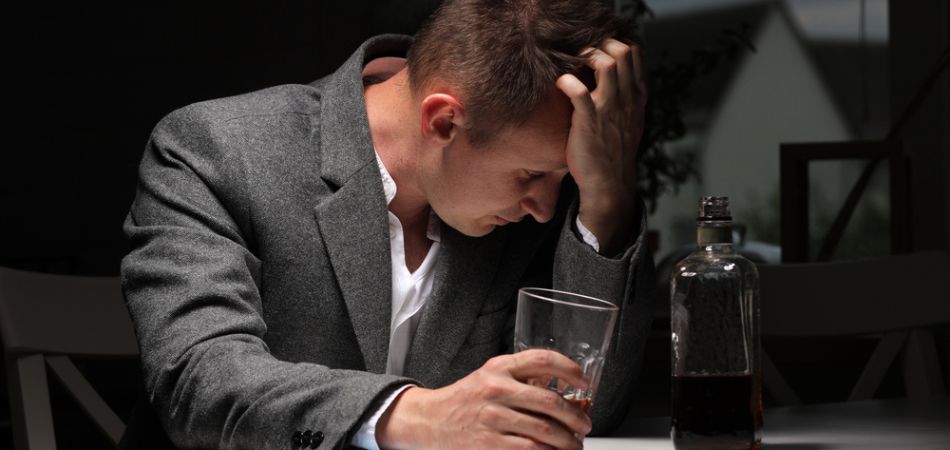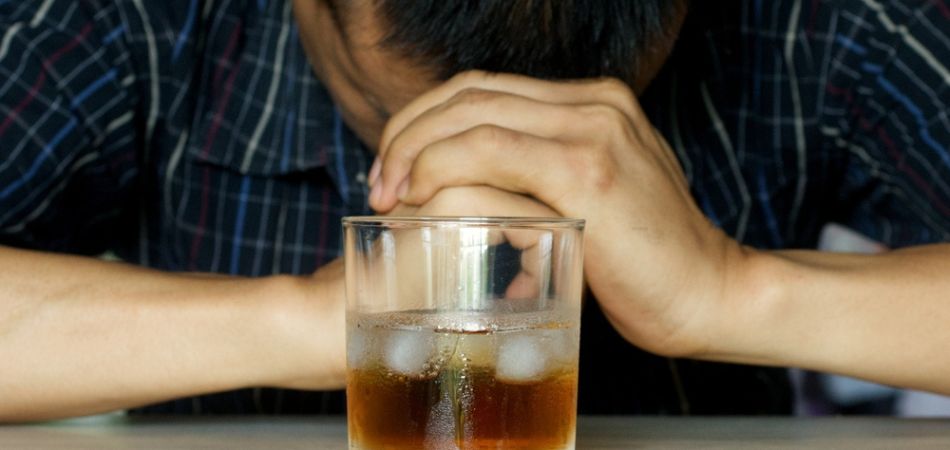Last Updated:
August 14th, 2025

For almost every person who suffers from an alcohol or substance addiction, there will be times when they feel the desperate urge to escape, by any means necessary. Regardless of its deleterious effects, going cold turkey and completely turning your back on drinking may feel like the only way to move forward.
Yet, there are risks in sudden alcohol cessation that slip under many radars. Without the right support, suddenly quitting may become too overwhelming and, in some cases, life-threatening.
This article explores why alcohol withdrawal so often requires professional support and what happens in the body when you quit suddenly. We’ll give you safer steps to take to mitigate the damage of alcohol withdrawal symptoms to support your recovery.
What is meant by “going cold turkey”?
For a person who has battled with alcohol addiction, they have undoubtedly heard the phrase going cold turkey. It means suddenly and completely stopping drinking, generally without tapering down or seeking medical help. In common parlance, going cold turkey can be used more lightheartedly, as people may state that they are addicted to something less harmful, such as social media or dating apps, so they choose to quit cold turkey.
As a point of interest, the phrase going cold turkey has roots stretching back to the early 1900s. The expression was used in an article in the 1921 Canadian newspaper The Daily Colonist. A doctor described a patient as needing cold turkey treatment. It is suggested that turkey and cold were adequate words to describe goose pimples and “the cold burn” that addicted people suffer as they withdraw.
Regardless of the etymological stem of the idiom, quitting alcohol and going cold turkey can feel like a raging war, in which willpower alone is not enough. It can carry serious risks, as alcohol is both physically and psychologically addictive and sudden withdrawal after years of deep addiction will cause overwhelming symptoms.
Some people might be lucky enough to only experience mild effects when quitting drinking, but for most who have drunk heavily for years, going cold turkey can be life-threatening.
Common symptoms of alcohol withdrawal
Before delving into the specific dangers of going cold turkey, we should first understand the plethora of common symptoms of alcohol withdrawal. They can range from mild discomfort to medical emergencies, usually beginning within 6 to 24 hours of your last drink, including:
Mild to moderate symptoms may include:
- Anxiety and restlessness
- Low mood or depression
- Fatigue and difficulty concentrating
- Insomnia and vivid dreams
- Nausea, vomiting, or loss of appetite
- Headaches
- Sweating and clammy skin
- Rapid heart rate and shaky hands
- Enlarged pupils
Severe symptoms (in more serious cases) include:
- Hallucinations (visual, auditory or tactile)
- High fever
- Seizures
- Delirium tremens
What happens during alcohol detoxification?
As we’ve listed, the constellation of alcohol withdrawal symptoms can be extensive and difficult to manage. When you stop drinking after a period of heavy or prolonged alcohol use, the body goes through the process of detoxification. As the name implies, the toxic elements of alcohol, which is technically a poison, are cleared from the body. The process of detoxing means your body readjusts to its absence, which can be strenuous if alcohol is something the body has come to depend on.
During alcohol detox, the brain is recalibrating its chemistry. Alcohol is a depressant, meaning it slows down body and brain function by enhancing GABA (a calming neurotransmitter). It also suppresses glutamate production in the brain. Over time, your brain compensates by reducing GABA and increasing glutamate. So, when alcohol is suddenly removed, the balance is thrown into chaos. The results are often anxiety, depression, overstimulation and, in severe cases, seizures and delirium tremens.
Physically, the liver begins to process the remaining alcohol in your bloodstream, while your nervous system spins into overdrive. Blood alcohol levels can drop, as well as your blood pressure spiking. For the immune system and your heart, the sudden shock can be painful and dangerous if other health conditions are present.
What makes going cold turkey so dangerous?
We’ve outlined what generally happens to most people when detoxifying from alcohol use or abuse. Healthcare providers and treatment specialists agree that alcohol withdrawal, when the addiction is severe, is always safer when it isn’t done alone.
It may sound like a bold and determined move to quit alcohol abruptly and to never return. Going headlong into alcohol cessation, without tapering down and without any outside support, there will likely be risks that cannot be avoided. In general, the longer you’ve been addicted and the larger the amount of alcohol you usually use, the more important it becomes not to detox alone.
Let’s consider a scenario of a person who has regularly drunk more than the NHS’s recommended maximum of 14 units per week, for more than a decade:
They’ve been drinking heavily every other day, on average, 4 days of the week. They feel low, suffering mentally and feel physically unwell, deciding that enough is enough. In a bold surge, they pour their final drink, toss the bottle and swear off alcohol forever.
After 2 days of cessation, new symptoms arise. Shaky hands, headaches, nausea and troubled sleep. Thoughts race as they try to relax, snapping them away from the calm that should be felt in sobriety. They utter to themselves in a hushed tone, “Is what I’m feeling normal?”
Symptoms intensify and a wave of overwhelming anxiety becomes an unbearable weight, physically removing their sense of control. In a panicked rush to escape the chaos, they return to alcohol, not because they want to be drunk, but to return to the feeling of normalcy.
The alcohol rushing into their system feels like a heartbreaking statement of failure. They’ve relapsed again.
But, in some ways, they have not completely failed to recover. They just tried to do it the hardest way possible. This is why medical detox programmes are here. Not to take away your autonomy, but to support your journey and give you the best chances of long-term, complete recovery.
What is the safest way to get off alcohol?
While it may be tempting to detox at home to avoid the discomfort of clinical settings, doing so without professional help can be dangerous.
A healthcare provider can assess your level of alcohol dependence and tailor a tapering plan or inpatient detox programme to keep you safe throughout the process.
In a medical setting, withdrawal symptoms can be managed with medications, hydration and around-the-clock response to complications. Benzodiazepines, for instance, are often prescribed by medical professionals to reduce the severity of painful symptoms. Doctors will also check for any underlying issues, such as liver damage or malnutrition, that may complicate withdrawal.
But safety isn’t just a matter of your physical body. It encompasses your mental state, too. Professional detox programmes give you the emotional and psychological support you need, helping you build coping strategies and avoid relapse. Detoxing this way ensures you’re not white-knuckling it through the journey, but instead stepping into recovery with the best possible foundation.
For many, this foundation means ongoing support through alcohol rehab, where both physical and emotional needs are met safely.
Where can I find support for quitting alcohol?
If you’re considering quitting alcohol, you might be feeling very alone right now. Please remember that even in the darkest times, help is out there.
Going cold turkey may feel like your best path to sobriety, but you may be running risks that you shouldn’t, especially if you’ve been drinking heavily for a long time. There’s nothing weak about asking for help; in fact, it may be the bravest, smartest step you ever take.
Here at UKAT, we specialise in detox programmes tailored to you. Our staff are on hand to help manage every withdrawal symptom and keep you safe. We provide expert-led therapy to guide you through every emotional challenge of withdrawal. From the first day of treatment to long after your return home, you’ll never feel like you’re suffering alone.
A healthier, sober future starts with a single decision. Reach out to UKAT today and begin your journey of healing and sobriety, free from the grip of alcohol addiction.
(Click here to see works cited)
- “Where Does the Phrase ‘Cold Turkey’ Come From?” Merriam-Webster, Merriam-Webster, www.merriam-webster.com/wordplay/why-do-we-quit-cold-turkey
- “Alcohol Withdrawal: Causes, Symptoms, Timeline and Treatment Options.” WebMD, WebMD, www.webmd.com/mental-health/addiction/alcohol-withdrawal-symptoms-treatments
- Davies M. The role of GABAA receptors in mediating the effects of alcohol in the central nervous system. J Psychiatry Neurosci. 2003 Jul;28(4):263-74. PMID: 12921221; PMCID: PMC165791.
- NHS Choices, NHS, www.nhs.uk/live-well/alcohol-advice/the-risks-of-drinking-too-much


